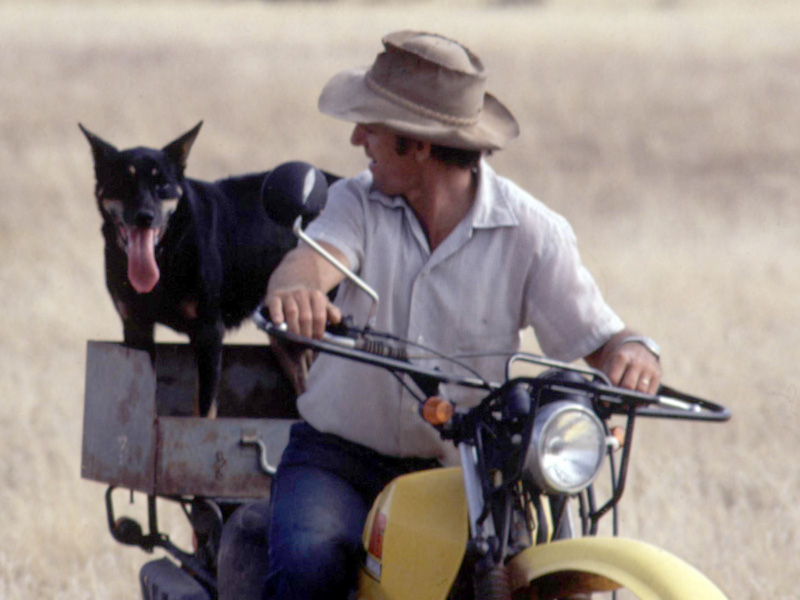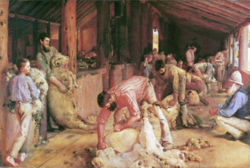The great Aussie obsession with the heroic farmer
 Today on ABC's AM radio, Clive Hamilton of the Australia Institute criticised the latest drought relief package ($350 million) the government is setting aside for Aussie farmers.[1] There are two interesting points here:
Today on ABC's AM radio, Clive Hamilton of the Australia Institute criticised the latest drought relief package ($350 million) the government is setting aside for Aussie farmers.[1] There are two interesting points here: - Hamilton suggests such a relief package is practising bad economics; and
- such bad economics are supported by what he calls the "bush myth".
"Droughts happen regularly in this country and there is a marked difference between how farmers prepare for drought ... some do it well, some do it badly and if the soil blows away that is a sign of bad farm management." ...This is a completely fair point. The major agricultural industries are very protected in Australia for various reasons, but that level of protection does absolutely nothing to discourage poor farm and land management – in both an economic and environmental sense. And, perhaps more pertinently, it does nothing to encourage untalented farmers to try their hand at alternate professions!
... Dr Hamilton says he believes it is other farmers who often feel most frustrated by the awarding subsidies.
"The real difference is going to be within the bush itself because there are more and more farmers out there who are managing for drought. They are the ones who manage to maintain grassed areas, or covered areas, which continue to be grazed during a drought," he said.
"They don't qualify for drought relief because they are good managers, they are the ones that are becoming annoyed because they see the farmers in the next paddock who aren't managing for drought are constantly getting bailed out by the taxpayer."
When I was of pre-school age, my family bought a piece of land which included an area about twice the size of a footy oval which was simply a huge dustbowl. The previous owner had allowed cattle or some other livestock to overgraze this delicate, low-lying area rendering it completely useless for any farming with it's nutrient-rich topsoil having blown away long ago in the wind.
My father's first act was to fence that area off and leave it alone. Now, twenty years on it is almost completely covered in saltbush and is minimally useful for occasional grazing – such as during a drought. And a small part of it – no doubt with the help of inorganic fertilisers – has been annexed to the area used in the crop-growing cycle. Most importantly though, it's being used in a sustainable way now.
Now, Hamilton is known for his "radical" or "forward-thinking" ideas in Growth Fetish but I find nothing overly radical or revolutionary about the following:
The great Australian bush myth, Dr Hamilton says, is behind the community and bipartisan political support for farming subsidies.I've carried a similar idea myself for some time but not been able to articulate it.
"I think the only way to explain why the governments, that otherwise claim to be economically rational bail out families constantly is because they are such an important part of the Australian mythology," he said.
"I mean we love to imagine ourselves to be stoical Aussies out there battling against the elements and I think we in urban areas get a kick out of thinking those farmers are somehow representing our better selves.
"But it is a very expensive way to maintain a national myth." ...
 I think some people may claim that this is a gross over-generalisation by Hamilton, but no one can claim the heroic conceptualisation of Australian sheep, cattle and crop-growers in previous decades didn't exist and doesn't still pervade Australia today. There are numerous examples. Think of iconic Australian paintings — Tom Robert's Shearing the Rams or Russell Drysdale's Drover's wife, etcetera... Think of classic Australian poetry — the narrator in Banjo Patterson's Clancy of the Overflow talks dreamily of swapping places with Clancy the drover, and the jolly swagman in Waltzing Matilda steals a sheep!
I think some people may claim that this is a gross over-generalisation by Hamilton, but no one can claim the heroic conceptualisation of Australian sheep, cattle and crop-growers in previous decades didn't exist and doesn't still pervade Australia today. There are numerous examples. Think of iconic Australian paintings — Tom Robert's Shearing the Rams or Russell Drysdale's Drover's wife, etcetera... Think of classic Australian poetry — the narrator in Banjo Patterson's Clancy of the Overflow talks dreamily of swapping places with Clancy the drover, and the jolly swagman in Waltzing Matilda steals a sheep!To be fair, the heroic Aussie farmer is not a national myth, but neither is the hopelessly incompetent Aussie farmer. And it's hard not to begin to suspect that this national obsession with overprotecting agricultural industries in Australia doesn't have a detrimental effect on the health of the land for one, not to mention progress in indigenous land rights...
I clearly would like to stand behind Hamilton here and say how about taking a different approach where farmers who really are heroes, who treat the land with respect, who educate themselves on how to manage it properly and sustainably get the rewards. Let's not reward those who mistreat land their ancestors got for free 200 or less years ago and make no effort to adopt measures to ensure their farming is at a level of intensity appropriate to the changing environment and changing climate. Above all, let's not let politicians who want to reward bad farming practices get away with it!
Woolgrower and dog image courtesy of Woolisbest.com.
Categorised as: politics, nature
Technorati Tags: Australian politics, Clive Hamilton, drought relief, Australian drought, woolgrowing, sheep husbandry, sustainable farming, sustainability, Australian culture, Australian agriculture, farming





9 Comments:
You've made a point I couldn't agree with more.
When my cousin took over the family farm on the west coast (above Goyder's Line) my uncle hit the roof when he found out what my cousin had planned in addition to just wheat and sheep.
My uncle still won't admit he was wrong but catch him after a few beers and he's as pleased as punch that our farm is one of the most prosperous in the region.
What is truly unbelievable is that the "protect the bush" vote is still so strong. I'm surprised more right-wing economists don't tear Howard apart when he gets all agrarian socialist.
Thanks for comments. Southozbloke, what other things did your cousin start in addition to just wheat and sheep? Alternative stuff?
Mick, has it just been Howard who "gets all agrarian socialist"? I think being seen to "support Aussie farmers" is a kind of holy cow in Australian politics for all sides.
I think this kind of support given to farmers is kind of nice since the rest of the time people outside of cities are largely forgotten (eg. most people on farms more than 50km from a capital city probably still won't have non-satellite broadband in 15 years).
On the other hand, it's badly implemented when it's basically rewarding bad farm/land management -- which I suspect it does.
Approaches that provide incentives for farmers who revegetate land and take actions to avoid and repair land erosion do exist but they are very limited. Pump more money into them before rewarding the farmers who stuff up the land thanks!
lisa, I'm not suggesting that all sides don't play for the "protect the bush" vote.
The dumb thing is that Howard is generally perceived by right-wing economists as an economic rationalist that believes in small government. This doesn't fit the reality, especially in these circumstaces.
I tend to agree. I also don't see why Howard is so adamant that he would never offer farmers the opportunity to sell up and get out of the game. There must be at least some farmers who have seen the writing on the wall and would like to take such an opportunity.
Surely it's more cost-effective than forking out to subsidise them through indefinite droughts.
This is a common argument yet no one has ever pointed out specifically which farmers are believed to be inefficient or operating unsustainably on marginal land so an objective assessment can then be made whether they are or not. It is always a broad argument without justification.
Also it doesn't take into consideration that farm subsidies are for specific issues depending on the type of farm.
The problem with most people is they only consider the farmers in the bush but what about the towns and what effects uprooting farmers would have on towns. There's only one thing you hear about country areas and that's whinging. Nevermind that is where the highest prices always hit first and cause the most harm but because it is less populous no one cares.
Vee, this is the first time I've heard this argument and that's why I gave it some 'airtime' on my blog.
I imagine there will never be any quantitative analysis done of farms and areas as you describe it, until the idea that this is a genuine problem gets some currency. So I don't think this is a reason to no-no the suggestion that farmer occupying ecologically delicate land or mismanaged farmland be given incentives to get out of farming or move to more ecologically-sustainable locations.
As to your suggestion that people only consider farmers "in the bush", I'm not even sure what do you mean? I'm well aware of the contribution of farmers and their children make to both the small-town and large-town (and regional city) communities. Just because a farmer contributes to holding together a community does NOT excuse mismanagement of farmland though!!
Lisa, I don't disagree many such farmers need to be encouraged to either move or practice sustainable land management but only when you pinpoint which ones can you offer any advice with certainty.
I'm rarely as articulate as I would like to be, what I meant with "in the bush" or country areas - the only thing people ever mentions is the farmers and they don't give two hoots about the rest or how it will affect the rest. This includes the towns, and the secondary and tertiary industries that rely on the farm sector.
If you attempt to force regulation of any sort down people's throats, they'll oppose it. Incremental change is the best approach.
Ultimately corporate welfare for the corporate farms is what needs to be removed.
It is also important to understand farmers are updating their practice but it takes a while to filter down to them from the interfering government bodies and there is always some resistance to new ideas.
One such method that is slowly gaining traction is Natural Sequence Farming
Ideally we need to phase out some of our European farming practices and it is happening. Slowly, but happening.
I would comment on economic rationalism leads to employment losses and a lack of adequate information of infrastructure location (for development and construction purposes) in country areas but I feel that is another topic.
Vee, what you are saying makes sense and I feel like I know where you are coming from. I agree that farming in Australia cannot be neatly separated from other micro-economies outside the cities (and indeed in the cities to some point) as Hamilton would imply.
What Hamilton is talking about IS a very radical shakeup of a system that's likely been in place since before either of us can remember.
And I think it is possible Hamilton has not considered "farmers" in the holistic sense of what farming means to rural communities and rural economies. I really see your point.
From his writing I see many of Hamilton's ideas as sane and sensible and ultimately aimed at ensuring sustainability. This is a really longterm view that he takes. In reality these ideas that would be very hard implement. I agree the "incremental change" would have to be in very small and careful increments, with consideration of the impacts on related economies.
Post a Comment
<< Home